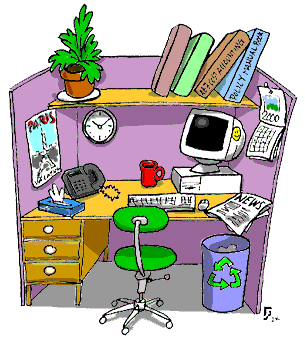If you work in a cubicle, or really any type of office space, you know how bleak it can look. The gray walls, the beige carpet, the dividing boundaries between you and your co-workers, the fluorescent lights overhead; all of these things make for a boring space in which to work. Keeping a small potted plant, pictures of your family or your cherished vacations, or even just using brightly colored file folders can make your cubicle or office more inviting. It turns out that personalizing and decorating your workspace does more than just brighten things up. Doing so can prevent burnout and emotional exhaustion. Maybe this is something you knew all along without realizing it, but now science is proving it: a cheerful and personal workspace can fend off a bad emotional state. A Scale of Emotional Burnout The research into how your workspace affects you emotionally was led by the School of Management at the University of Michigan-Flint and published recently in the Journal of Environmental Psychology. The study was based on a questionnaire that asked nearly 100 white-collar employees about their emotional exhaustion in relation to their jobs and workspaces. The questionnaire was previously developed and tested by researchers at the UC Berkeley. It measures emotional burnout based on exhaustion, personal achievements and levels of personalization at work. The participants were given a series of statements and asked to rate how true each statement was to their personal experiences, and how often they felt that way. One statement read, “I feel used up at the end of the workday.” Participants could rank that statement on a scale from mild to strong agreement and from a few times a year to once a day. This helped the researchers see how emotionally exhausted workers were and how often they felt that way at work. In addition to the questionnaire on emotional burnout, participants answered questions about the style of office they worked in, whether it was a cubicle or private space with a door. They also listed the items in their workspace, including personal and decorative items. Privacy Equals Bliss One important finding from the study is that workers with privacy were happier than others. For instance, workers who had an office with a door that could be closed were less burned out than those who worked in cubicles surrounded by fellow employees. The researchers concluded that having privacy allowed workers to avoid distractions and interferences, which reduced burnout. Working in a cubicle means that your every move is visible to everyone else. This can be a stressful feeling. Cubicle workspaces also lead to disruptions in your daily work because there is little sense of boundaries. Without a door, your co-workers may feel free to walk on over and strike up a conversation, even while you are trying to work. Clearly, privacy at work can reduce stress, allow you to get more done, and therefore, lower your emotional burnout. Personalization Also Equals Bliss That privacy at work leads to happy workers is not exactly surprising. What was more interesting from the research on workplace burnout was the finding that personalizing a cubicle can reduce burnout as much as having a private office with a door can. The workers that completed the questionnaire and reported having personalized workspaces seemed to have the same low-level of exhaustion as closed door workers. These decorative cubicle workers included such items as pictures of family and friends, bumper stickers and coffee mugs, posters, plants, and other items that reflected their own interests outside of work. The researchers believe that this type of decorating gives you a sense of calm throughout the day, in spite of working in a cubicle space. The calming effect can help you to cope with the distractions inherent in that type of work setting. The message is pretty simple and clear: personalize your work space and be happier. Employers need to take notice of this finding and allow workers to decorate to their hearts’ content. Insisting on conformity of appearance is just plain bad for mental health, and happy workers mean better productivity.

